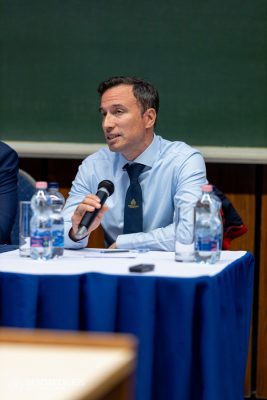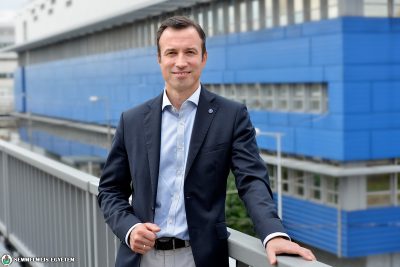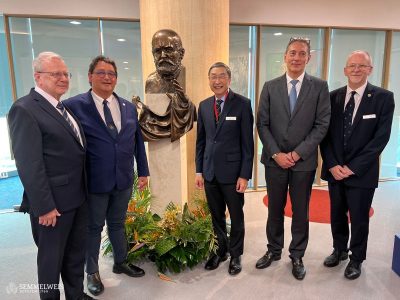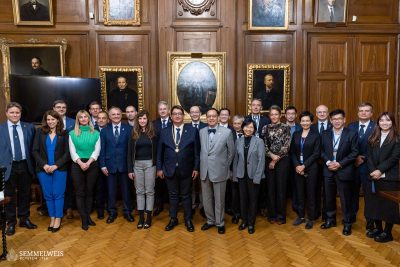Recalling the early days, Gábor Orbán stressed that it was a great honour to be asked to lead the foundation. “Although it was a bit of a dilemma to take on the workload of the CEO position at Richter and the responsibility of such a position, I made up my mind quickly. The history of Semmelweis University, its extraordinary prestige in Hungary and the region, the synergies between Richter and Semmelweis and the good relations with the university’s management all encouraged me to accept this invitation, and the experience of the first year confirmed that I made the right decision,” Gábor Orbán said.
As he explained, one of the Foundation’s key tasks is to provide the framework for the realization of the vision set out by the University’s management.
“An important indicator of this is that Semmelweis University is among the top 100 universities in the world and among the top 5 medical universities in Europe. The Foundation should identify areas where efficiency and performance can be further improved, identify potential barriers and promote strategic thinking and results orientation in its operations,” he emphasized.
As Chairman of the Board of Trustees, Gábor Orbán’s most important task is to facilitate the overall implementation of a change in approach focused on performance, which requires setting targets and developing interest- and incentive schemes. At the same time, he stressed that this process did not start with the establishment of the foundation, as the institution’s management was previously characterized by the pursuit of excellence and the proactive search for tasks.

The president considers the first steps of the new human resources strategy, such as the increase of the basic salary and the establishment of a remuneration system based on individual performance, as a significant achievement of the past year. “All these measures will serve both to create a more competitive working environment that attracts and retains talent, and to encourage even greater performance,” he explained.
In the coming period, one of the main tasks will be to continue implementing the HR strategy, as that is an important element in further strengthening the high quality of teaching, research and care. In addition, the foundation’s priority is to promote the implementation of the University’s development plans and the establishment of corporate partnerships, which, in addition to generating market revenues, can also provide opportunities for the University to engage in new world-class projects.
The president also pointed out that Semmelweis University and Richter are linked by decades of professional cooperation and a number of shared values, such as serving people’s health, strategic thinking, pursuit of excellence, innovation and internationalism.
In 2019, they also signed a strategic cooperation agreement, which includes a scholarship program for PhD students, a talent management competition, and joint work on the renewal of pharmacy training and R&D at the university.
“Since 2008, we have had 11 research collaborations with Semmelweis University, worth approximately 200 million forints (HUFs), and we currently have 3 active joint proposals in progress,” Gábor Orbán said, adding that in the past year they have continued to work on broadening cooperation, with seven joint working committees set up to identify the areas most suitable for further cooperation. “For Semmelweis University, one of the most important breakout points is to participate in the health ecosystem and to be part of the industrial RDI chain,” he said.

Gedeon Richter, who was born 150 years ago and is the founder of the now multinational pharmaceutical company Richter, which is still run by Hungarians, graduated in pharmacy at the University of Budapest, the predecessor of Semmelweis University. According to historical sources, Richter later developed his research activities not only within the factory, but also collaborated with a number of university institutes.
The university is commemorating the 150th anniversary of Richter in collaboration with the pharmaceutical company in several ways. The Laboratory of Business Technology of the Faculty of Pharmacy will take the name of Gedeon Richter. Plus, a scientific award will be named after Richter, in recognition of his scientific and innovative work in the field of pharmaceutical sciences. In addition, a proposal for the establishment of “Richter Department” will soon be submitted to the Senate, which will deal with current issues in pharmaceutical research and development and will further deepen the cooperation between Semmelweis University and Richter in this field.
Pálma Dobozi – translation by Rita Kónya
Photo: Attila Kovács – Semmelweis University, Richter (archive picture)



